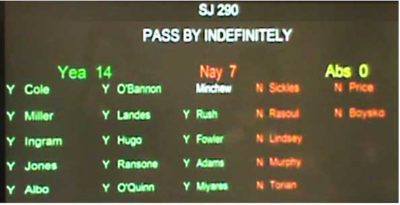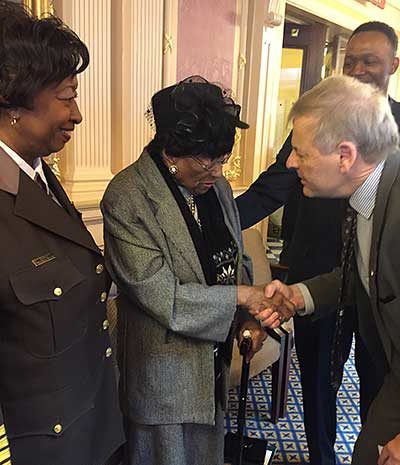With Washington D.C. in chaos, the emerging opposition to the Trump Agenda is having an impact in Virginia. We are seeing more citizens come to the State Capitol to protest the conservative agenda and argue for values we consider important, such as increasing the minimum wage, creating greater economic opportunity for more Virginians, investing in public education, protecting Planned Parenthood, or bringing redistricting reform.
Maneuvers Block Nonpartisan Redistricting
Redistricting reform has gained considerable attention in Richmond over the last two weeks. Several House bills were defeated in subcommittees without recorded votes, and advocates for redistricting reform were frustrated time and time again by the convoluted, contrived, and confused procedural maneuvering designed to prevent any bills from getting to the House Floor for a vote. On Tuesday, several measures that had been passed by the Senate received a hearing before a packed audience at 7 a.m. The bills were defeated 5-2 on a party-line vote. This morning however, House Democrats were able to resurrect two of these bills but both of them were defeated in the full committee on a party-line vote.

To say that this issue has been contentious is an understatement, but it is clear that some Republican incumbents want to continue to draw districts in a way that benefit them and disadvantage their opponents. I have supported a nonpartisan redistricting commission since I came to Richmond in 2006. I have noticed more interest in this issue this year than at any time that I have served in the General Assembly. I will continue to press for a nonpartisan commission because it is the best way to take politics out of a process that more and more citizens feel is rigged. To see my Tuesday floor speech on redistricting, visit my Facebook page.
Legislative Veto? A Clear Power Grab
We are seeing a number of divisive bills get from committees to the House Floor, some of which have involved blatant attempts to grab power away from the Governor and concentrate it among House Republicans. Included in these measures are proposed constitutional amendments that would allow a “legislative veto” of any regulations proposed by the Executive branch. One of the measures would even allow a small group of Delegates to nullify or suspend regulations when the General Assembly is not in session. While most citizens want assurances that regulations are not overly burdensome, they also believe in the concept of the separation of powers, so ably articulated by James Madison in the Federalist Papers. Proposed Constitutional Amendments need to be approved with identical language in each of two consecutive legislative sessions separated by an election. It is not clear whether this “legislative veto” amendment will pass this session or next. Constitutional Amendments are not subject to a gubernatorial veto, unlike many of the socially-divisive bills passed in this session that will likely be vetoed by the Governor. Instead, Constitutional Amendments are submitted directly to the voters.

Heading Toward Veto
Included among the bills likely to be vetoed by the Governor is the extension of the coal tax credit, a measure that would provide a massive subsidy to electrical generators and coal companies allegedly to produce jobs. Various reports, including our own legislative audit several years ago, have concluded that the coal tax credit does nothing but provide millions of taxpayer dollars to corporations; in fact, the number of jobs in coal country has dropped precipitously over the last twenty years while the credit has been in place. For that reason, the Governor is likely to veto the bill, which costs Virginia taxpayers millions of dollars each year.
Passed Bills with Promise
One of the more interesting bills passed in the last week involves the creation of a tax amnesty program, which will cover Virginians who, for one reason or another, are seriously behind in paying their taxes. Under this program, certain penalties would be forgiven for a certain period if the deficiencies are promptly paid. It is estimated that this program could raise between $30 and $58 million dollars, which we would put aside for future needs. We also passed a bill that would allow foster kids to take advantage of community college financial assistance to allow them to go to school after they have turned eighteen.
From the Floor
For those of you interested in seeing any of my recent floor speeches, you can view them all on Facebook. And I welcome and appreciate feedback from my constituents. To comment on any legislation, please contact me at DelDToscano@house.virginia.gov or feel free to call my office in Richmond during the General Assembly session at 804-698-1057. If you’re in Richmond during the session, which ends on February 25, our office is in Room 614 of the General Assembly Building.
